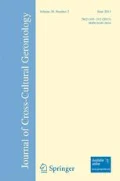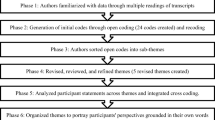Abstract
There is very little research on Alaska Native (AN) elders and how they subjectively define a successful older age. The lack of a culturally-specific definition often results in the use of a generic definition that portrays Alaska Native elders as aging less successfully than their White counterparts. However, there is a very limited understanding of a diverse array of successful aging experiences across generations. This research explores the concept of successful aging from an Alaska Native perspective, or what it means to age well in Alaska Native communities. An adapted Explanatory Model (EM) approach was used to gain a sense of the beliefs about aging from Alaska Natives. Research findings indicate that aging successfully is based on local understandings about personal responsibility and making the conscious decision to live a clean and healthy life, abstaining from drugs and alcohol. The findings also indicate that poor aging is often characterized by a lack of personal responsibility, or not being active, not being able to handle alcohol, and giving up on oneself. Most participants stated that elder status is not determined by reaching a certain age (e.g., 65), but instead is designated when an individual has demonstrated wisdom because of the experiences he or she has gained throughout life. This research seeks to inform future studies on rural aging that prioritizes the perspectives of elders to impact positively on the delivery of health care services and programs in rural Alaska.
Similar content being viewed by others
References
Administration on Aging. (2008). Profile of older Americans. Website: www.AoA.gov.
Alaska Commission on Aging. (2008). Press release. Available online: http://www.alaskaaging.org/assets/SeniorGrowth.pdf.
Bowling, A., & Dieppe, P. (2006). What is successful aging and who should define it? British Medical Journal, 331, 24–31.
Burton, L. M., Dilworth-Anderson, P., & Bengston, V. L. (1992). Creating culturally relevant ways of thinking about diversity and aging: Theoretical challenges for the twenty-first century. In E. Percil Stanford & F. M. Torres-Gil (Eds.), Diversity: New approaches to ethnic minority aging. New York: Baywood.
Clark, M., & Anderson, B. G. (1967). Culture and aging: An anthropological study of older adults. Illinois: Charles C. Thomas.
Denzin, N. K., & Lincoln, Y. S. (2000). Handbook of qualitative research. Thousand Oaks: Sage.
Fisher, B. J. (1995). Successful aging, life satisfaction, and generativity in later life. International Journal of Aging & Human Development, 41(3), 239–250.
Gruenewald, T. L., Karlamangla, A. S., Greendale, G. A., Singer, B. H., & Seeman, T. E. (2007). Feelings of usefulness to others, disability, and mortality in older adults: the MacArthur study of successful aging. Journal of Gerontology: Psychological Sciences, 62B, P28–P37.
Herzog, A. R., & House, J. S. (1991). Productive activities and aging well. Generations, 15(1), 49–55.
Ikels, C., Dickerson-Putnam, J., & Draper, P. (1995). Comparative perspectives. In L. A. Bond, S. J. Cutler, & A. Grams (Eds.), Promoting successful and productive aging. London: Sage.
Keith, J., Fry, C. L., & Ikels, C. (1990). Community as context for successful aging. In J. Sokolovsky (Ed.), The cultural context of aging. New York: Bergin and Garvey.
Keith, J., Fry, C. L., & Glasock, A. P. (1994). The aging experience: Diversity and community across cultures. London: Sage.
Kleinman, A. (1980). Patients and healers in the context of culture. An exploration of the borderland between anthropology, medicine, and psychiatry. Berkeley: University of California Press.
Lloyd, K. R., Jacob, K. S., Patel, V., St. Louis, L., Bhurga, D., & Mann, A. H. (1998). The development of the Short Explanatory Model Interview (SEMI) and its use among primary care attendees with common mental disorders. Psychological Medicine, 28, 1231–1237.
Parker, M. W., Bellis, J. M., Bishop, P., Harper, M., Allman, R. M., Moore, C., et al. (2002). A Multidisciplinary model of health promotion incorporating spirituality into a successful aging intervention with African American and white elderly groups. The Gerontologist, 42(3), 406–415.
Phelan, E. A., & Larson, E. B. (2002). Successful aging—where next? Journal of the American Geriatrics Society, 50, 1306–1308.
Phelan, E. A., Lynda, A. A., LaCroix, A. Z., & Larson, E. B. (2004). Older adults views of “successful aging”—how do they compare with researchers definitions? Journal of the American Geriatrics Society, 52, 11–26.
Reichstadt, J., Depp, C. A., Palinkas, L. A., Folsom, D. G., & Jeste, D. V. (2007). Building blocks of successful aging: a focus group study of older adults’ perceived contributors to successful aging. The American Journal of Geriatric Psychiatry, 15(3), 194–201.
Rowe, J. W., & Kahn, R. L. (1987). Human aging: usual and successful. Science, 237, 143–149.
Sarkisian, C. A., Hays, R. D., & Mangione, C. M. (2002). Do older adults expect to age successfully? The association between expectations regarding aging and beliefs regarding healthcare seeking among older adults. Journal of the American Geriatrics Society, 50, 1837–1843.
Strauss, A., & Corbin, J. (1998). Basics of qualitative research. Techniques and procedures for developing grounded theory (2nd ed.). Thousand Oaks: Sage.
Strawbridge, W. J., Wallhagen, M. I., & Cohen, R. D. (2002). Successful aging and wellbeing: self-rated compared with Rowe & Kahn. The Gerontologist, 42(6), 727–733.
Tate, R. B., Lah, L., & Cuddy, E. B. (2003). Definition of successful aging by elderly Canadian males: the Manitoba follow-up study. The Gerontologist, 43(5), 735–744.
Torres, S. (1999). A culturally-relevant theoretical framework for the study of successful aging. Ageing and Society, 19, 33–51.
Torres, S. (2003). A preliminary empirical test of a culturally-relevant theoretical framework for the study of successful aging. Journal of Cross-Cultural Gerontology, 18, 79–100.
Torres, S. (2006). Different ways of understanding the construct of successful aging: Iranian immigrants speak about what aging well means to them. Journal of Cross-Cultural Gerontology, 21, 1–23.
Verbrugge, L. (1984). Longer life but worsening health. Trends in health and mortality in middle-aged and older persons. The Milbank Memorial Fund Quarterly, 62, 475–519.
von Faber, M., Bootsma-van der Weil, A., van Exel, E., Gussekloo, J., Lagaay, A. M., can Dongen, E., et al. (2001). Successful aging in the oldest old. Who can be characterized as successfully aged? Archives of Internal Medicine, 161, 2694–2700.
Whitman, K. E., Seeman, T. E., Miles, T. P., Albert, M. S., Berkman, L. F., Blazer, D. G., et al. (1997). Health indices as predictors of cognition among older African Americans: MacArthur Studies of successful aging. Ethnicity & Disease, 7(2), 127–136.
Author information
Authors and Affiliations
Corresponding author
Appendix 1
Appendix 1
Rights and permissions
About this article
Cite this article
Lewis, J.P. Successful Aging through the Eyes of Alaska Natives: Exploring Generational Differences Among Alaska Natives. J Cross Cult Gerontol 25, 385–396 (2010). https://doi.org/10.1007/s10823-010-9124-8
Published:
Issue Date:
DOI: https://doi.org/10.1007/s10823-010-9124-8



